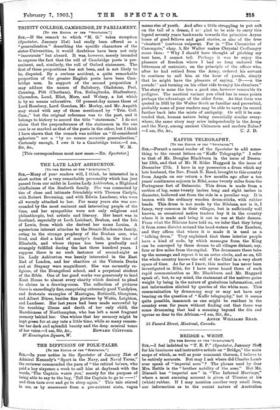TRINITY COLLEGE, CAMBRIDGE, IN PARLIAMENT. [To THE EDITOR OF THE
" SPECTATOR."f SIR,—If the remark to which "H. G." takes exception (Spectator, January 31st) had really been offered as a " generalisation " describing the specific characters of the sister-Universities, it would doubtless have been not only " inaccurate " but absurd. It was, however, merely intended to express the fact that the roll of Cambridge poets is pre- eminent, and, similarly, the roll of Oxford statesmen. The first of these propositions has not been, and is not likely to be, disputed. By a curious accident, a quite remarkable proportion of the greater English poets have been Cam- bridge men. In support of the second proposition I may adduce the names of Salisbury, Gladstone, Peel, Canning, Pitt (Chatham), Fox, Bolingbroke, Shaftesbury, Clarendon, Laud, Eliot, More, and Wolsey, a list which is by no means exhaustive. Of present-day names those of Lord Rosebery, Lord Goschen, Mr. Morley, and Mr. Asquith may stand with any of those mentioned by " Trin. Coll. Cam.," but the original reference was to the past, and it belongs to history to accord the title "statesman." I do not claim that the preponderance of the statesmen in the one case is as marked as that of the poets in the other, but I think I have shown that the remark was neither an "ill-considered aphorism" nor a "by no means accurate generalisation." Curiously enough, I owe it to a Cambridge tutor.—I am,
[This correspondence must now cease.—ED. Spectator.]










































 Previous page
Previous page